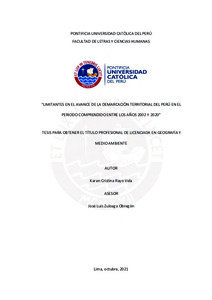| dc.contributor.advisor | Zuloaga Obregón, José Luis | |
| dc.contributor.author | Rayo Vela, Karen Cristina | |
| dc.date.accessioned | 2021-12-17T18:40:35Z | |
| dc.date.available | 2021-12-17T18:40:35Z | |
| dc.date.created | 2021 | |
| dc.date.issued | 2021-12-17 | |
| dc.identifier.uri | http://hdl.handle.net/20.500.12404/21196 | |
| dc.description.abstract | La presente investigación tiene como finalidad identificar las limitantes que han
dificultado el avance en la demarcación territorial del Perú en el periodo comprendido
entre los años 2002 y 2020. Investigaciones como esta son importantes en cuanto
permiten identificar aquellos elementos que deben mejorarse en relación a la
demarcación territorial del Perú para que, a partir de ello, se logre una adecuada
organización territorial y límites saneados que faciliten un mejor manejo del territorio,
gestión municipal y departamental, y se eviten conflictos sociales. Esta investigación
presenta el marco técnico-normativo de la demarcación territorial en el Perú y describe
los avances y analiza la situación actual de este tema en el país. Finalmente, analiza los
principales problemas y/o dificultades en relación a los procesos de demarcación
territorial en el Perú. En este marco, se presentan y analizan las limitantes identificadas
en cuatro dimensiones: económica, institucional, política y sociocultural. Esta
investigación corresponde a una investigación de nivel explicativa del tipo aplicada. Se
basa en un enfoque cualitativo y utiliza como diseño de investigación la inducción
analítica. El muestreo es no probabilístico y el tamaño de la muestra está en relación a
la saturación de la información. Como método de recolección de información se utiliza
las entrevistas semiestructuradas a expertos, contando con la participación de los
especialistas de la Secretaría de Demarcación y Organización Territorial y especialistas
de las Unidades Técnicas de Demarcación Territorial de los gobiernos regionales, que
son los principales actores competentes en temas de demarcación territorial. | es_ES |
| dc.description.abstract | The purpose of this research is to identify the limitations that have hindered progress in
the territorial demarcation of Peru in the period between 2002 and 2020. Researches
like this one is important insofar as it allows identifying those elements that must be
improved in relation to the territorial demarcation of Peru so that, from this, an
adequate territorial organization and sanitized limits are achieved that facilitate better
management of the territory, municipal and departmental management, and avoiding
social conflicts. This research presents the technical-regulatory framework of territorial
demarcation in Peru, then describes the progress and analyzes the current situation of
this issue in the country. Finally, it analyzes the main problems and / or difficulties in
relation to the territorial demarcation processes in Peru. In this framework, the
limitations identified in four dimensions are presented and then analyzed: economic,
institutional, political and sociocultural. This research corresponds to an explanatorylevel
investigation of the applied type. It is based on a qualitative approach and uses
analytical induction as its research design. The sampling is non-probabilistic and the size
of the sample is in relation to the saturation of the information. As a method of gathering
information, semi-structured interviews with experts are used, with the participation of
specialists from the Secretariat of Demarcation and Territorial Organization and
specialists from the Technical Units of Territorial Demarcation of regional governments,
who are the main competent actors in territorial demarcation issues. | es_ES |
| dc.language.iso | spa | es_ES |
| dc.publisher | Pontificia Universidad Católica del Perú | es_ES |
| dc.rights | info:eu-repo/semantics/openAccess | es_ES |
| dc.rights | Atribución-NoComercial-SinDerivadas 2.5 Perú | * |
| dc.rights.uri | http://creativecommons.org/licenses/by-nc-nd/2.5/pe/ | * |
| dc.subject | Perú--División política y administrativa | es_ES |
| dc.subject | Fronteras territoriales--Perú | es_ES |
| dc.subject | Geografía política--Perú | es_ES |
| dc.title | Limitantes en el avance de la demarcación territorial del Perú en el periodo comprendido entre los años 2002 y 2020 | es_ES |
| dc.type | info:eu-repo/semantics/bachelorThesis | es_ES |
| thesis.degree.name | Licenciado en Geografía y Medio Ambiente | es_ES |
| thesis.degree.level | Título Profesional | es_ES |
| thesis.degree.grantor | Pontificia Universidad Católica del Perú. Facultad de Letras y Ciencias Humanas | es_ES |
| thesis.degree.discipline | Geografía y Medio Ambiente | es_ES |
| renati.advisor.dni | 47006592 | |
| renati.advisor.orcid | https://orcid.org/0000-0002-1192-7093 | es_ES |
| renati.author.dni | 46166382 | |
| renati.discipline | 532036 | es_ES |
| renati.juror | Rondon Ramirez, Gustavo Adolfo | es_ES |
| renati.juror | Zuloaga Obregon, Jose Luis | es_ES |
| renati.juror | Novoa Goicochea, Zaniel Israel | es_ES |
| renati.level | https://purl.org/pe-repo/renati/level#tituloProfesional | es_ES |
| renati.type | https://purl.org/pe-repo/renati/type#tesis | es_ES |
| dc.publisher.country | PE | es_ES |
| dc.subject.ocde | https://purl.org/pe-repo/ocde/ford#5.07.00 | es_ES |






